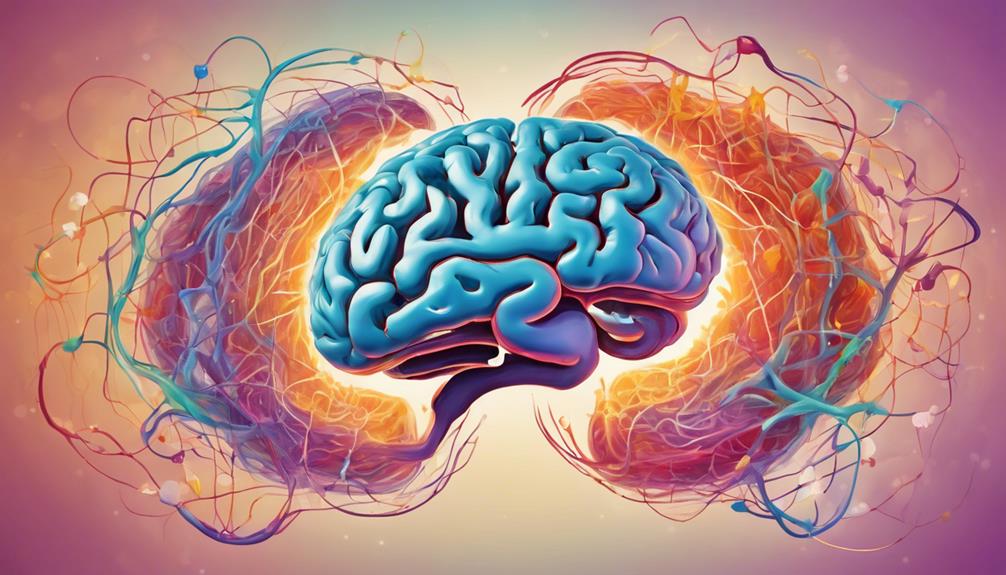Gut and Psychology Syndrome by Natasha Campbell-McBride – Summary and Review

Gut health and mental well-being are closely linked, with over 100 trillion microorganisms in the human gut impacting our psychological health.
Natasha Campbell-McBride's research delves into the connection between gut health and mental well-being, emphasizing the importance of nurturing our gut microbiota for overall wellness.
Key Takeaways
- Gut flora influences mental well-being via the gut-brain axis.
- Balancing gut health is crucial for emotional stability and cognitive clarity.
- Holistic approaches can enhance mental well-being and overall vitality.
- Probiotics play a significant role in supporting gut health and emotional balance.
The Gut-Brain Connection Explored
In exploring the intricate relationship between the gut and the brain, Natasha Campbell-McBride delves deep into the profound impact of gut health on mental well-being. The gut flora, a complex ecosystem of microorganisms residing in the digestive tract, plays a pivotal role in influencing brain function. This intricate interplay between the gut and the brain, often referred to as the gut-brain axis, highlights the bidirectional communication pathway that exists between these two essential organs.
Research has shown that the gut flora can modulate neurotransmitter levels, regulate inflammation, and even affect mood and behavior. Imbalances in gut bacteria have been linked to conditions such as anxiety, depression, and even neurodegenerative diseases. Understanding the importance of maintaining a healthy gut microbiome is critical for optimizing brain function and promoting overall well-being.
Campbell-McBride's exploration into the connection between gut health and brain function underscores the significance of nurturing our gut flora for cognitive clarity, emotional stability, and mental freedom. By fostering a balanced gut ecosystem, individuals can empower themselves to enhance their brain health and release their full potential.
Understanding Gut Microbiota Function
An intricate orchestra of microorganisms within the digestive tract, the gut microbiota orchestrates a symphony of functions essential for overall health and well-being. The balance of microbiota and diversity of gut flora play a critical role in maintaining a harmonious relationship between the gut and the rest of the body. To emphasize the significance of microbiota balance and gut flora diversity, consider the following table:
| Microbiota Balance | Gut Flora Diversity |
|---|---|
| Supports immune function | Enhances nutrient absorption |
| Regulates metabolism | Aids in the synthesis of vitamins |
| Protects against harmful pathogens | Influences mood and cognitive function |
| Maintains gut barrier integrity | Helps in the breakdown of complex carbohydrates |
| Supports gastrointestinal motility | Contributes to overall gut health |
Understanding the important functions carried out by the gut microbiota sheds light on the intricate mechanisms that underlie our well-being. In nurturing a diverse and balanced gut flora, individuals can pave the way for excellent health and vitality.
Impact of Gut Health on Mental Well-being
The intricate interplay between gut health and mental well-being reveals a profound Gut-Brain Connection that shapes one's overall health.
Natasha Campbell-McBride's work illuminates the profound Link between Gut Health and Mental Health, emphasizing a holistic approach to wellness.
Understanding this connection could pave the way for a more thorough and balanced approach to mental well-being.
Gut-Brain Connection
Within the intricate web of the human body, the profound connection between gut health and mental well-being weaves a tapestry of crucial influence, where the health of one profoundly impacts the energy of the other. The communication between the brain and the gut is a sophisticated interplay that goes beyond mere digestion; it plays a pivotal role in emotional regulation. When the gut is in harmony, the brain experiences clarity and stability, fostering a positive state of mind. Conversely, disturbances in gut health can lead to a cascade of effects on mental well-being, potentially manifesting as mood disorders or cognitive challenges. This intricate relationship underscores the importance of nurturing both gut and brain health for overall vitality and emotional equilibrium.
| Brain Gut Communication | Emotional Regulation | Impact on Mental Well-being |
|---|---|---|
| Two-way signaling pathway | Balancing mood swings | Clarity and stability |
| Regulates stress response | Enhancing emotional well-being | Positive state of mind |
| Influences neurotransmitter production | Regulating anxiety levels | Improved cognitive function |
| Affects serotonin levels | Managing stress levels | Reduced risk of mood disorders |
| Linked to mental health issues | Supporting overall mental health | Maintaining emotional equilibrium |
Mental Health Link
In exploring the intricate relationship between gut health and mental well-being, one uncovers a profound link that shapes the landscape of emotional equilibrium and cognitive essentiality.
- Mental health benefits: A balanced gut flora can contribute to improved mood, reduced anxiety, and better stress management.
- Gut health correlation: Research suggests that disturbances in gut health can lead to various mental health issues such as depression, anxiety, and even neurodevelopmental disorders.
- Holistic perspective: Understanding and nurturing gut health can be a pivotal step towards enhancing mental well-being, emphasizing the importance of a holistic approach to health and wellness.
Holistic Wellness Approach
Embracing a complete approach to wellness, one can discern the profound impact of gut health on mental well-being, illuminating the interconnected essence of physical and emotional vitality.
The mind-body connection is a powerful force, where the health of one directly influences the other. In the domain of integrative medicine, understanding this symbiotic relationship becomes paramount.
When the gut is in a state of imbalance, it can lead to a cascade of effects on mental health, such as anxiety, depression, and cognitive impairments. By nurturing the gut through proper nutrition, stress management, and holistic practices, individuals can enhance their mental well-being and overall quality of life.
This holistic view empowers individuals to take charge of their health, promoting a harmonious balance between mind and body.
Healing the Gut for Psychological Wellness
To achieve psychological wellness, one must prioritize the healing of the gut, recognizing its profound impact on mental health and overall well-being. The healing journey towards gut restoration is a vital step in attaining a harmonious balance between the mind and body. Here are three essential aspects to contemplate in this transformative process:
- Nutrition: Embrace a diet rich in whole foods, probiotics, and prebiotics to nourish the gut microbiome and support peak brain function.
- Stress Management: Implement mindfulness practices, meditation, or yoga to reduce stress levels, as chronic stress can disrupt gut health and contribute to psychological imbalances.
- Lifestyle Changes: Incorporate regular physical activity, guarantee adequate sleep, and limit exposure to toxins to promote gut healing and enhance mental clarity.
Practical Strategies for Gut Health
Setting out on a journey towards improved gut health necessitates a mindful selection of gut-healing foods and integrating probiotics into one's daily routine.
These practical tactics serve as the groundwork for nurturing a healthy gut environment that can positively influence overall well-being.
Gut-Healing Foods
Exploring the world of gut-healing foods requires a keen understanding of the nourishing properties that can restore balance and vitality to one's digestive system. When delving into this domain, consider the following:
- Healing Recipes: Embrace recipes rich in whole foods, fiber, and nutrients that support gut health. Dishes like bone broth, fermented vegetables, and gut-soothing herbal teas can work wonders.
- Gut Friendly Supplements: Incorporate supplements such as probiotics, prebiotics, and digestive enzymes to enhance gut flora and aid digestion.
- Hydration: Don't underestimate the power of staying hydrated with water, herbal teas, and coconut water to support the mucosal lining of the gut and promote overall digestive health.
Probiotics for Health
Understanding the intricate balance of gut health, one can't overlook the transformative role that probiotics play in nurturing a flourishing ecosystem within the digestive system. Probiotics, known for their ability to enhance gut flora importance, offer a myriad of benefits that contribute to overall well-being. These beneficial bacteria aid in digestion, strengthen the immune system, and support mental health.
Natasha Campbell-McBride's Expert Insights
Natasha Campbell-McBride imparts invaluable insights that illuminate the intricate connection between gut health and mental well-being, shedding light on the profound impact of the Gut and Psychology Syndrome. Her expertise explores the following key aspects:
- Gut Flora: Campbell-McBride emphasizes the vital role of gut flora in maintaining overall health, highlighting how a balanced microbiome is essential for proper digestion, absorption of nutrients, and immune function.
- Brain Function: Through her work, Campbell-McBride examines the detailed relationship between the gut and the brain, emphasizing how gut health can influence cognitive function, mood regulation, and even neurological conditions.
- Nutritional Therapy: Drawing on her expertise, Campbell-McBride advocates for the power of nutritional therapy in healing the gut and improving mental well-being, underscoring the importance of a nutrient-dense diet in restoring balance to the body and mind.
Campbell-McBride's insights serve as a beacon of wisdom for those seeking to understand and harness the profound connection between gut health and psychological wellness.
Final Thoughts on Gut-Brain Axis
In unraveling the intricate web of connections between gut health and mental well-being, Natasha Campbell-McBride's discourse on the Gut-Brain Axis culminates in profound insights that underscore the significant impact of a balanced relationship between the gut and the brain. This relationship is vital for emotional regulation and overall well-being. Campbell-McBride emphasizes the importance of dietary interventions in nurturing this symbiotic connection, advocating for a diet rich in probiotics, prebiotics, and nutrient-dense foods to support both gut and brain health. By acknowledging the bidirectional communication between the gut and the brain, individuals can empower themselves to take charge of their health through mindful eating practices that prioritize gut health.
| Emotional Regulation | Dietary Interventions |
|---|---|
| Vital for well-being | Rich in probiotics |
| Balances mental health | High in prebiotics |
| Supports emotional stability | Nutrient-dense foods |
| Linked to gut health | Nurtures gut-brain axis |
| Empowers individuals | Mindful eating practices |
Frequently Asked Questions
Can Gut Health Impact More Than Just Mental Well-Being?
The intricate balance of the gut microbiome can profoundly influence emotional regulation. Its health impacts extend beyond mental well-being, affecting various aspects of one's overall health and energy, showcasing the interconnectedness of mind and body.
How Do Certain Foods Affect the Gut-Brain Connection?
Certain foods can trigger gut inflammation, leading to a cascade of effects on the gut-brain connection. This can result in brain fog, impacting mental clarity and overall well-being. Understanding these connections empowers individuals to make informed dietary choices.
Are There Any Specific Gut-Healing Protocols Recommended by Natasha Campbell-Mcbride?
Natasha Campbell-McBride recommends healing diets and protocols to nurture the gut microbiome. Her approach emphasizes the crucial connection between the gut and overall health, offering strategies that empower individuals to take charge of their well-being.
How Long Does It Typically Take to See Improvements in Mental Health After Focusing on Gut Health?
Physical improvements may manifest within a few weeks of focusing on gut health. Emotional changes and cognitive enhancements often follow suit. Behavioral shifts may take longer, but a holistic approach can expedite the process.
Can Gut Health Play a Role in Conditions Outside of Mental Health, Such as Autoimmune Diseases or Skin Conditions?
A person's gut health can indeed influence conditions beyond mental health. It has been found to impact autoimmune diseases and skin conditions. The gut's well-being plays a crucial role in maintaining overall health and wellness.










